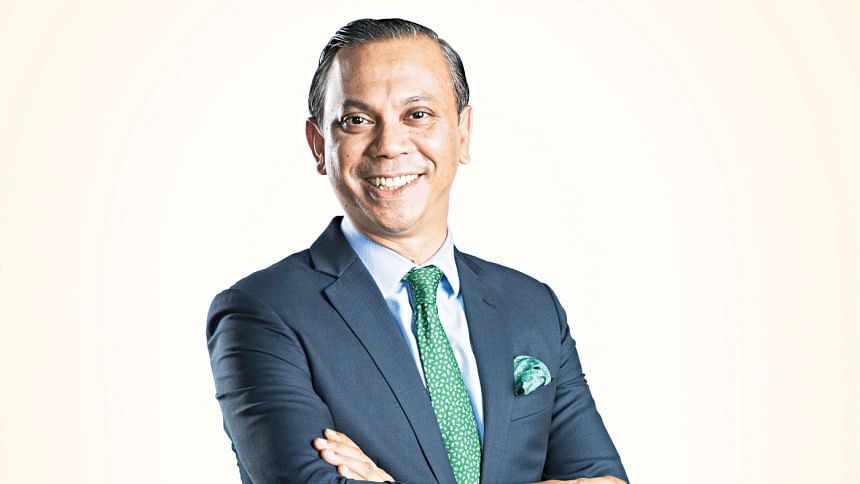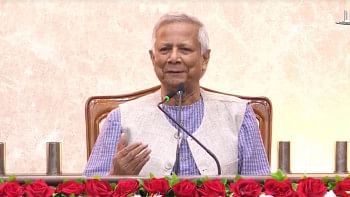SMEs and technology were game changers for IPDC

IPDC Finance has recovered from a sinking position to become one of the best non-bank financial institutions (NBFIs) in Bangladesh by shifting its focus to untapped sectors, according to the company's Managing Director Mominul Islam.
Back in 2006, the country's first NBFI saw its default loan rate soar to 37 per cent while another 13 per cent was at risk of being rescheduled.
As such, IPDC's performance started lagging as it slipped from top spot to 21st among 33 financial institutions.
"So, we stepped forward and took some initiatives to bring radical changes to the company," Islam told The Daily Star in a recent interview.
"First, we worked to clean the balance sheet of bad assets," he said.
IPDC then worked to standardise its policies to prevent new loans from turning sour before going on to improve the technical know-how and efficiency of employees to make its business environment transparent and customer centric.
After that, the NBFI took aim at some unexplored areas in the small-and-medium enterprise (SME) sector outside of Dhaka and Chattogram. Most lenders do not prefer SMEs even though there are more than 78 lakh cottage, micro, small and medium enterprises across Bangladesh that are a safe bet.
"Besides, our corporate directors were aware of the company's situation and did not force any measures on us and instead allowed us to take any decision necessary," Islam added.
Deposits with IPDC stood at about Tk 4,753 crore while its total loans and advances amounted to Tk 6,136 crore as of September this year.
IPDC's current classified loan ratio is 1.64 per cent, company data shows.
Islam said the NBFI set aside around Tk 120 crore, or 2 per cent of its total loans, as an additional provision to protect against any unexpected impacts of Covid-19.
But rather than falling prey to the coronavirus fallout, IPDC's profits surged to Tk 70 crore in 2020, up 25 per cent from Tk 56 crore the year before. Meanwhile, its profits have already soared to Tk 84 crore in the first nine months of this year.
IPDC became the first non-bank financial institution in the country back in 1981 with an aim to support private sector growth.
Aligning with this goal, IPDC helped fund many private sector initiatives from five-star hotels to international standard hospitals, the managing director said.
The NBFI also kicked off a number of financial products in Bangladesh, such as housing finance, venture capital, preferred shares, and so on.
IPDC's struggle for survival began when private banks first started popping up across Bangladesh as it faced serious competition from traditional lenders that have no restriction on providing long-term loans.
In many countries, banks are not allowed to provide such loans and mostly deal with short-term disbursements or other services. Instead, NBFIs are there to cater to long-term loans for industrialisation.
Even in Sri Lanka, no banks are allowed to disburse loans for a period of more than three years. So, NBFIs in the country do not face much competition in this regard.
But since there is no such bar on banks in Bangladesh, IPDC had suffered for its failure to strengthen its internal capacity and business strategy in line with the new economic environment.
Besides, funds from international financiers had dried out, forcing the NBFI to start borrowing from commercial banks to only re-disburse the funds as long-term loans.
"That was a huge mistake," Islam said.
At one stage, assuming that IPDC might go bankrupt, many employees left the business.
But despite all these challenges along the way, IPDC bounced back strongly after some young and energetic blood was injected into the company alongside Islam in 2006, when it had no star players.
And after the NBFI introduced some fresh policies and risk management criteria, and cleaned its balance sheet, Brac came forward in 2015 to invest in it.
Now, the non-government development organisation holds a 25 per cent stake in IPDC while the government holds 22 per cent, the Ayesha Abed Foundation holds 10 per cent, Uttara Group holds 11 per cent, RSA Capital holds 5 per cent, and the rest is owned by stock market investors.
"We reshaped our business plan and targeted SMEs as there were several banks that lent to big industries but micro, cottage, small and medium enterprises had no one to turn to for finance even though it was a vast and untapped sector," he said.
IPDC also targeted people, including women, outside Dhaka and Chattogram who could hardly avail any financial service despite an increase in their income level.
"Our target was to lend at a very small ticket and the response has been fantastic as their repayment behaviour is much better than big borrowers," the managing director added.
However, the company's distribution channel and systematic process to reach SMEs both inside and outside the two major metropolitan zones was not very cost effective.
IPDC then realised that technology would be a key driver to reach these clients in a quick and cost-effective way.
Since SMEs do not have any collateral to offer against their loans, IPDC issues disbursements against their work orders or other bills.
"We have already built up a digital platform with the help of IBM, so now everything from work order issuance to bill submission can be done online and with that, IPDC can sanction a loan within three working days," Islam said.
The NBFI also introduced a blockchain based product called Arjon to lend to retailers. IPDC lent about Tk 1,000 crore last year through the blockchain system.
"We have been working with Unilever and British American Tobacco Bangladesh as well to lend their suppliers in rural areas," he added.
IPDC already catered to the loans of 13,000 customers through its Dana project and aims to reach 10 lakh customers by 2026. Its app based system is underway.
For a better distribution channel, the company went for collaborations with many companies, such as BSRM, Berger, and bKash, to make the lending process easy and cost-effective.
These collaborations and the introduction of new technology were game changers.
Regarding challenges in the NBFI sector, Islam said the first issue is image building as the poor performance of some companies affects the entire industry.
The second challenge is ensuring long-term financing for the sector.
"If the local bond market doesn't develop, then NBFIs will face problems," said Islam, also chairman of the Bangladesh Leasing and Finance Companies Association.
Third, NBFIs cannot receive current savings.
"So, if Bangladesh Bank allows the use of digital wallets, then we can get savings accounts and cater digital services without any cash transaction," he said, adding that the central bank could analyse how to convert NBFIs into digital banks.
The managing director went on to say that the legal framework for NBFIs in Bangladesh is still not conducive and so, wilful defaulters dare to roam about freely and even travel abroad.
Some NBFIs were even robbed by their rogue directors and senior officials who should face legal action.
Considering the situation, "the legal framework should be more strong and strict".
Loans should be embedded with insurance to reduce the risks of banks and NBFIs. In the first stage, insurers need to charge low to popularise the product.
"On the other hand, the depositors of NBFIs should be treated well and we should have a mechanism to reconstruct those institutions by amalgamation," Islam said.
If an NBFI requires funds, the government could arrange it for the sake of depositors and thereby restore confidence in the sector.
In the NBFI sector, some companies are strong and big while others are quite weak. So, the same prescription cannot suit all.
Strong restrictions are expected but the same restrictions for all will impact smaller firms badly.
For example, there are three types of rules and regulations for NBFIs in India depending on their business pattern.
Similarly, a strong bond market is necessary and so, the process of issuance should be very easy.
"We from the association are working to enhance our efficiency, promote good corporate governance and ensure that CEOs will get government support if they face any pressure from directors to participate in illegal works," Islam said.

 For all latest news, follow The Daily Star's Google News channel.
For all latest news, follow The Daily Star's Google News channel. 



Comments